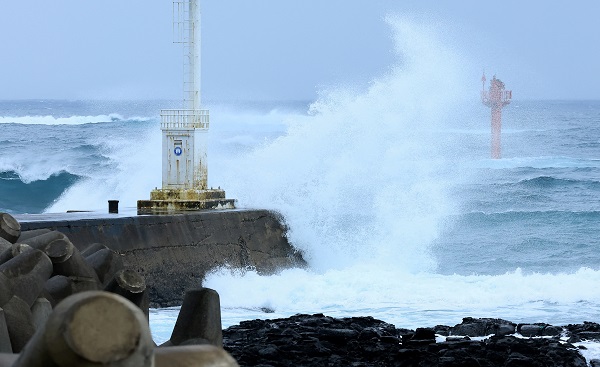 A high wave caused by typhoon Khanun hits a seawall in Seogwipo on Jeju island, South Korea, 9 August 2023;
Credit: Yonhap via Reuters
A high wave caused by typhoon Khanun hits a seawall in Seogwipo on Jeju island, South Korea, 9 August 2023;
Credit: Yonhap via Reuters
TOKYO/SEOUL (Reuters) - On Wednesday 9 August 2023, flights were cancelled and trains halted as heavy rain from Typhoon Khanun pounded southern regions of Japan and South Korea, just as another storm approached from the east to threaten Tokyo ahead of Japan's peak summer holiday season.
Khanun could make landfall at the southeastern South Korean port city of Tongyeong on Thursday 3 August 2023, before tracking up the Korean peninsula, authorities said.
The storm is currently in the sea south of Kyushu, Japan's southwestern main island some 860 km from Tokyo, after wreaking havoc in the southwestern Okinawa region. It is maintaining its strength and moving at an unusually slow 10 kph, meaning the wind and rain will linger for longer.
Areas of Kyushu have already been inundated with a whole month's worth on rainfall in the past week, the Japan Meteorological Agency (JMA) said.
The agency issued heavy rain and high wind warnings to many parts of southern and western Japan, prompting automakers including Toyota to suspend some production. Prime Minister Fumio Kishida cancelled his attendance at a ceremony on Wednesday to mark the anniversary of the atomic bombing of Nagasaki, in Kyushu.
Railway operator West Japan Railway Co suspended some bullet train services in Kyushu, while a professional baseball game scheduled there was cancelled.
South Korea issued its highest alert as Khanun forced the cancellation of nearly 80 flights and the closure of dozens of sea routes and roads, the interior ministry said.
On Tuesday 8 August 2023, officials evacuated more than 30,000 scouts from their campsite in the southwest ahead of the typhoon, the latest snag to hit the World Scout Jamboree.
President Yoon Suk Yeol has ordered authorities to prevent any further damage especially in regions hit by last month's torrential rain.
Another storm, Lan, had formed in the Pacific Ocean south of Japan and was predicted to strengthen as it heads north, possibly affecting Tokyo early next week, JMA said.
The two storms arrive at the start of Obon, Japan's peak summer holiday season when many people leave big cities for their ancestral hometowns.








